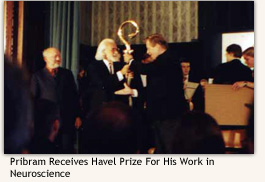Pribram Receives Havel Prize For His Work in Neuroscience
Article by Andreas Andrea
Hoya Staff Writer, Georgetown University
Katherine Neville and neuroscience pioneer Dr. Karl Pribram have traveled the world together for more than 20 years. Currently they reside in Virginia and Washington, DC where Karl is a distinguished professor at both Georgetown University (cognitive neuroscience) and George Mason University (computational neuroscience).
Karl Pribram, Ph.D., accepted the first Dagmar and Vaclav Havel Prize at Charles University in Prague on Tuesday. Pribram is a Distinguished Professor of Cognitive Sciences at Georgetown and is world-famous for his achievements in neuroscience.
President of the Czech Republic and award namesake Vaclav Havel presented the award, which honors outstanding academics who have contributed a great deal in their field.
“[Pribram] is an example to people of different fields and orientations, such as neurologists, psychologists, mathematicians, scientists and philosophers,” Havel said. “It is a wonder to see people from all over the world united by one purpose when so often the world is divided by distrust and small disparities.”
Havel led the Velvet Revolution of 1989 that ultimately brought an end to communism in Czechoslovakia. He was also a well-known playwright in the 1960s and spent time in jail in the 1970s as an enemy of the Communist Czechoslovakian government.
Pribram is of Czech ancestry and his father studied at Charles University. He earned a bachelor of science and his medical doctorate from the University of Chicago and developed the brain research program at the Yerkes Laboratory for Primate Biology in Atlanta. He spent 10 years at Yale University, where he also served as the director of research at the Institute for Living in Hartford, Ct. Pribram also received a Fulbright Fellowship to Cambridge University.

Pribram went on to earn a second fellowship to the Center for Advanced Studies at Stanford University, where he co-authored “Plans and the Structure of Behavior,” an influential book that launched the cognitive revolution in psychology. He worked for 30 years at Stanford University, where he became professor emeritus and received a lifetime research award from the National Institutes of Health.
In 1989, he was appointed Eminent Scholar of the Commonwealth of Virginia and was also awarded the James P. and Anna King Chair at Radford University in Virginia, where he directed the Center for Brain Research and Information Sciences.
Pribram was appointed Distinguished Professor of Cognitive Sciences at Georgetown in 1998, after 60 years of leadership in the field of brain research. He also serves as a researcher and faculty member in the Interdisciplinary Program in Cognitive Science.
